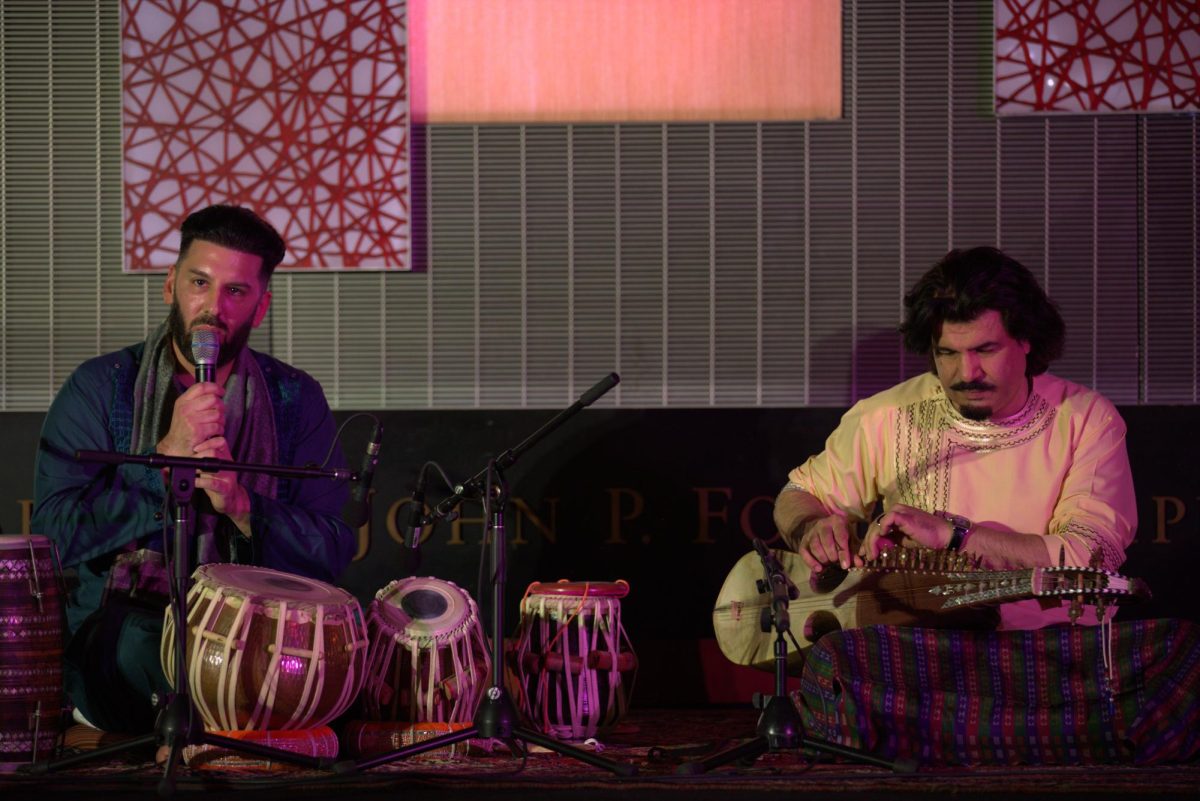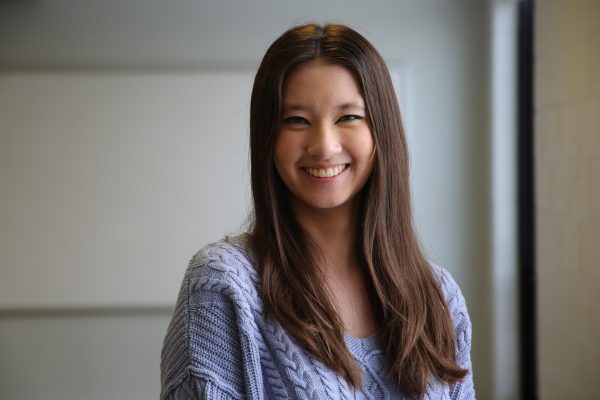Since he learned to play the tabla — hand drums from Central and South Asia — at seven years old, Salar Nader has performed throughout the world, making his St. Joe’s debut alongside fellow Afghan musician Homayoun Sakhi in Cardinal Foley Campus Center Oct. 23. However, performances involving Nader’s tabla and Sakhi’s rubab — a lute-like string instrument — are banned in Nader and Sakhi’s ancestral home.
The musical journey
Sakhi, born in Kabul, Afghanistan, learned to play the rubab, which is the country’s national instrument, from his father. In 1992, Sakhi and his family fled Afghanistan and moved to Pakistan following the Soviet Union’s invasion of the country, where he gained recognition for his rubab skills. Since 2001, he has lived in the U.S., performing and teaching rubab.
Sakhi said although he grew up hearing the rubab, he knew he wanted to play it after he woke up from a dream where he heard the rubab from the sky.
“The instrument chose me,” Sakhi said.
The sound of the rubab, Sakhi said, is one of the many reasons he loves the instrument dearly.
“It’s the sound of Afghanistan,” Sakhi said. “And that’s why I play this instrument. It’s so special for me.”
Nader was born in Germany where his parents fled to after the Soviet invasion of Afghanistan. During this decade-long conflict known also as the Russian-Afghan war, Nader’s parents eventually settled in the San Francisco Bay Area. Nader remembers walking into his first tabla class in 1985, at just seven years old, and began his tutelage under five-time Grammy Award-winning tabla artist Ustad Zakir Hussain. Nader was the only child in the class, with the next-youngest students being in their twenties and thirties.
“I’d been playing the tabla within family, household gatherings, fundraising concerts for Afghanistan, playing folk and traditional rhythms as a toddler,” Nader said. “But it was time to take the next steps on my rhythmic journey and musical journey.”
Throughout the years, Nader has collaborated with musicians across the globe and promoted Afghan culture on large stages, making his debut as an onstage musician in “The Kite Runner” on Broadway shortly after the Taliban re-took control in Afghanistan. During his tabla journey, he met Sakhi, who he has partnered with for nearly 30 years.
“Our music is rooted in spirituality, and you feel it when we get together and get on stage,” Nader said. “It really is, not to sound cliche, food for the soul.”
Bans and responses
Since the Taliban regained control of Afghanistan in August 2021, the country has been under a music and creative arts ban, with instruments like the tabla destroyed in bonfires.
Amber Abbas, Ph.D., associate professor of history and director of the Nealis Program in Asian Studies who coordinated the event, described this ban as “so deeply painful.”
“I grew up in Muslim culture that was filled with music, filled with poetry,” Abbas said. “Throughout Muslim societies, we have very rich musical traditions. The idea that the Taliban is trying to mark a firm boundary between what is ‘Muslim’ and what is ‘art’ is just so blind to the richness of the art that has been produced in Muslim societies.”
In light of bans and violence, Nader and Sakhi strive to share the beauty of Afghan culture, hoping their music brings light in the darkness.
“In this world of war and constant crises and battles, we need to cool the temperature down and share some positivity,” Nader said. “And that’s what we do. We try to give Afghanistan its positive image. Our message within our music is just love, compassion, positivity. And that’s what music is supposed to do. It’s supposed to uplift.”
The uplifting spirit of Nader and Sakhi’s music could be felt throughout Cardinal Foley, where people got out of their seats to dance along with the melody and children jumped and raised their hands when Nader asked who in the audience was Afghan.
“The impact was seen just through the audience here; everyone clapping along in unison,” Nader said. “And you had people of all diversities, all ethnic cultures, belief systems. But we were all one in that moment. And there was no ‘Oh this is them, and this is us.’ It was almost like we were one family.”
Changing perceptions
Afghanistan, Nader said, has a rich musical history, with instrumental music rooted in Sufism, a segment within Islam centered on mysticism, and its traditions. A goal of performing, Nader said, is educating audiences on the rich history of Afghan music.
“I was in Louisville, Kentucky once, and people were like, ‘Wait, you have music in Afghanistan? Wow, really? Well, what is it?’” Nader said. “And so part of what we do is we educate. It’s one thing to go on stage and play a rocking concert, but it’s another thing to educate our audiences and invite them into our musical traditions.”
Performing, however, is not always void of stereotyping, a result of negative portrayals of Afghanistan and Afghan people in media coverage. Nader said people sometimes “judge a book by its cover” during concerts and make assumptions about him while he’s wearing traditional Afghan attire.
In one instance, Nader was told secondhand that a family said he looked like a Taliban member. Then, after listening to him perform, the father of the family approached Nader and said he expected Nader to come onstage and chant “something like, ‘Death to America.’”
“My heart jumped,” Nader said. “Our sound engineer immediately turned around and [was] like, ‘Dude, what?’ And so he was like, ‘Sorry, I just couldn’t help [it], but my family was in tears watching you perform. You took a solo, and then you spoke to us, and you spoke about the rhythm, and our perception literally changed about Afghanistan.’”
Nader said it’s in those moments where he knows that performing is what he’s meant to do.
“That’s why I’m going to continue to be doing what I do until the last breath,” Nader said.
Justice and dialogue
Abbas said performances like Nader and Sakhi’s are important to have at St. Joe’s because they highlight the importance of promoting justice in a global context.
“It’s not just about showing up in our spaces here in the United States and advocating for social justice here,” Abbas said. “It’s also maintaining an awareness of what is happening in other parts of the world, and showing up with those same intentions about working towards a more just world for all the people in it, no matter what their backgrounds or identities are.”
The importance of starting conversations about diverse cultures and promoting justice was emphasized by Nader, who also runs the Salar Nader Tabla Foundation, which provides music and arts programming for youth. Sakhi, also promoting the importance of Afghan music, founded the Rubab Academy, an online school that provides rubab classes.
“I hope through what we do, the conversations we’re starting, we’re able to open the door, to not be the first Afghan American duo that comes to St. Joseph’s, but to be who opens the door and unlocks this beautiful conversation and dialogue for many, many more artists to come,” Nader said. “There’s so many reasons why this is important, and I always say, ‘We’re the first but not the last.’”













































